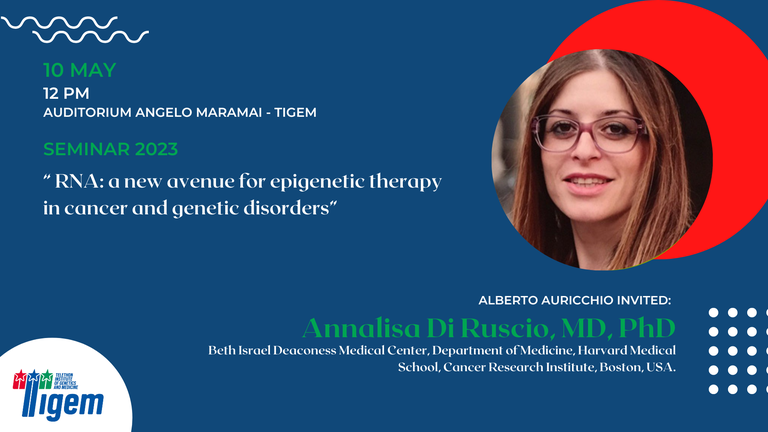Annalisa Di Ruscio, MD, PhD - "RNA: a new avenue for epigenetic therapy in cancer and genetic disorders"
- When May 10, 2023 from 12:00 PM to 01:15 PM (Europe/Berlin / UTC200)
- Where Tigem Auditorium Angelo Maramai
- Contact Name Alberto Auricchio
- Contact Phone 08119230659
-
Add event to calendar
iCal

- https://www.tigem.it/newsroom/seminars/annalisa-di-ruscio-md-phd-rna-a-new-avenue-for-epigenetic-therapy-in-cancer-and-genetic-disorders
- Annalisa Di Ruscio, MD, PhD - "RNA: a new avenue for epigenetic therapy in cancer and genetic disorders"
- 2023-05-10T12:00:00+02:00
- 2023-05-10T13:15:00+02:00
Annalisa Di Ruscio, MD, PhD
Beth Israel Deaconess Medical Center
Department of Medicine
Harvard Medical School
Cancer Research Institute
Boston, USA
Short CV
Abstract
DNA methylation is a critical epigenetic signature that regulates gene expression predominantly within CpG dinucleotides1,2. Methylation of CpG-rich promoters negatively correlates with gene expression leading
to long-term gene silencing3. Numerous studies have established links between aberrant promoter DNA methylation and cancer4. However, the causes behind the abnormal DNA methylation pattern remain largely unknown.
The current therapies influencing DNA methylation (HMAs) act indiscriminately on the entire genome leading to high toxicity and low specificity, thus impairing their clinical use. Although nearly 40-50 % of patients show an initial response, the effects are transient, resulting in poor prognosis and limited therapeutic options. Therefore, a critical need exists to create methods to restore the non-disease state DNA methylation profile in a gene-specific manner and overcome the limitations of the existing protocols.
The discovery of RNAs inhibiting DNMT1 enzymatic activity in a locus-specific modality – the DNA Methyltransferase 1(DNMT1)-interacting RNAs (DiRs), suggested that bespoke synthetic RNA molecules mimicking DiRs' function could reverse DNA methylation.
This assumption led to the generation of two RNA-based platforms to achieve selective and gene-specific demethylation and activation. The first one, aptaDiRs, binds and blocks DNMT1 activity, inducing widespread DNA demethylation in vitro and cell culture. In vivo, AptaDiRs inhibit tumor growth associated with a stronger DNA demethylation and gene reactivation than the approved HMA without observed toxicity. The second one, termed CRISPR-DiR, enables inhibition of DNMT1 in a gene-specific modality, and it has been tested on different targets: i.e., the tumour suppressor gene P16 and the transcription factor SALL4, along with others. In vitro, this approach led to sustained promoter demethylation and increased mRNA and protein levels. In vivo the P16_CRISPR-DiR led to the inhibition of tumor growth.
Collectively, this approach holds promise for a genuine, rather than nominal, non-toxic targeted therapy that will ultimately enable the development of RNA-precision medicine protocols tailored to the specific disease features. The introduction of this transformative strategy has the potential to revolutionize the treatment of cancer and rare genetic disease caused by aberrant DNA methylation.
Beth Israel Deaconess Medical Center
Department of Medicine
Harvard Medical School
Cancer Research Institute
Boston, USA
Short CV
Abstract
DNA methylation is a critical epigenetic signature that regulates gene expression predominantly within CpG dinucleotides1,2. Methylation of CpG-rich promoters negatively correlates with gene expression leading
to long-term gene silencing3. Numerous studies have established links between aberrant promoter DNA methylation and cancer4. However, the causes behind the abnormal DNA methylation pattern remain largely unknown.
The current therapies influencing DNA methylation (HMAs) act indiscriminately on the entire genome leading to high toxicity and low specificity, thus impairing their clinical use. Although nearly 40-50 % of patients show an initial response, the effects are transient, resulting in poor prognosis and limited therapeutic options. Therefore, a critical need exists to create methods to restore the non-disease state DNA methylation profile in a gene-specific manner and overcome the limitations of the existing protocols.
The discovery of RNAs inhibiting DNMT1 enzymatic activity in a locus-specific modality – the DNA Methyltransferase 1(DNMT1)-interacting RNAs (DiRs), suggested that bespoke synthetic RNA molecules mimicking DiRs' function could reverse DNA methylation.
This assumption led to the generation of two RNA-based platforms to achieve selective and gene-specific demethylation and activation. The first one, aptaDiRs, binds and blocks DNMT1 activity, inducing widespread DNA demethylation in vitro and cell culture. In vivo, AptaDiRs inhibit tumor growth associated with a stronger DNA demethylation and gene reactivation than the approved HMA without observed toxicity. The second one, termed CRISPR-DiR, enables inhibition of DNMT1 in a gene-specific modality, and it has been tested on different targets: i.e., the tumour suppressor gene P16 and the transcription factor SALL4, along with others. In vitro, this approach led to sustained promoter demethylation and increased mRNA and protein levels. In vivo the P16_CRISPR-DiR led to the inhibition of tumor growth.
Collectively, this approach holds promise for a genuine, rather than nominal, non-toxic targeted therapy that will ultimately enable the development of RNA-precision medicine protocols tailored to the specific disease features. The introduction of this transformative strategy has the potential to revolutionize the treatment of cancer and rare genetic disease caused by aberrant DNA methylation.
1 Illingworth, R. S. et al. Orphan CpG islands identify numerous conserved promoters in the mammalian genome. PLoS Genet 6, (2010).
2 Deaton, A. M. & Bird, A. CpG islands and the regulation of transcription. Genes Dev 25, 1010-1022, (2011).
3 Herman, J. G. & Baylin, S. B. Gene silencing in cancer in association with promoter hypermethylation. N Engl J Med 349, 2042-2054, (2003).
4 Baylin, S. B. & Jones, P. A. A decade of exploring the cancer epigenome - biological and translational implications. Nat Rev Cancer 11, 726-734, (2011).
5 Di Ruscio, A. et al. DNMT1-interacting RNAs block gene-specific DNA methylation. Nature 503, 371-376, (2013).
